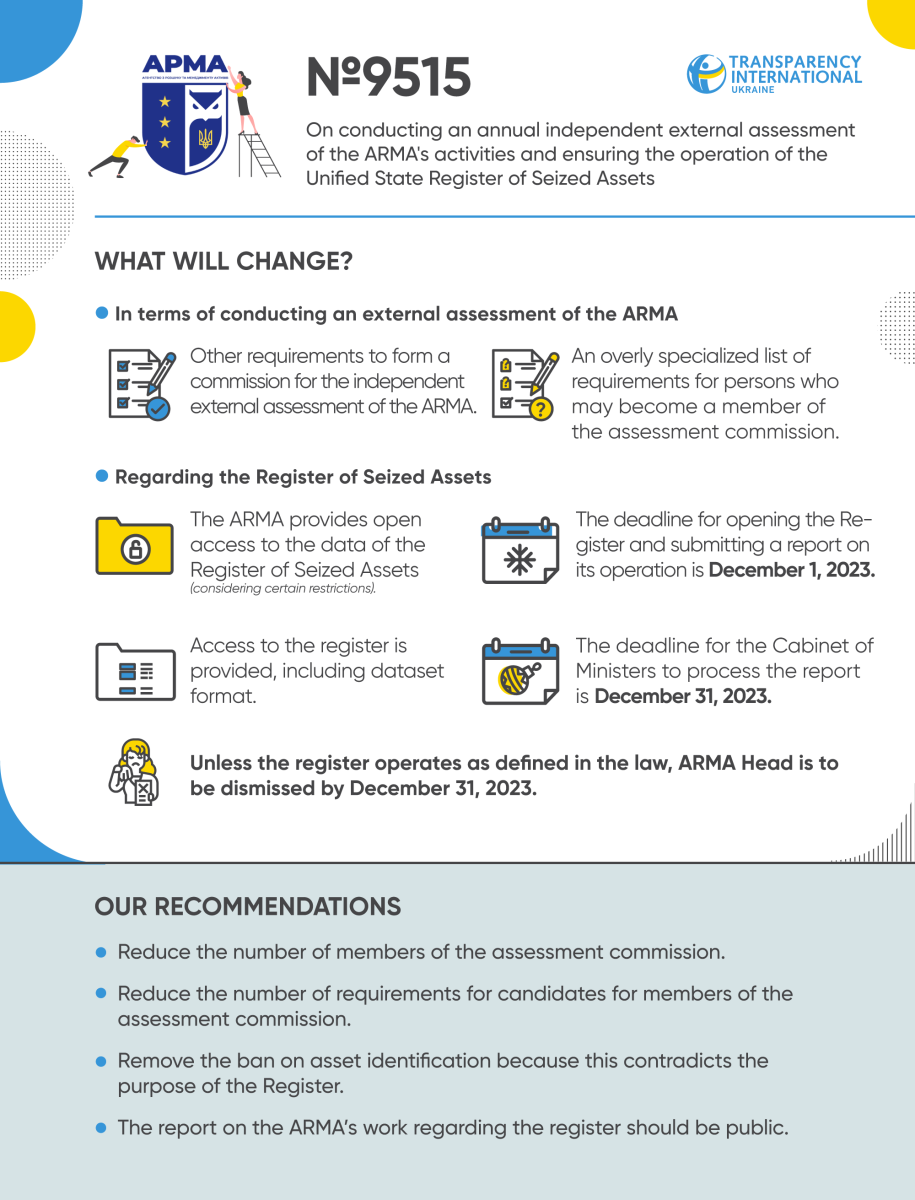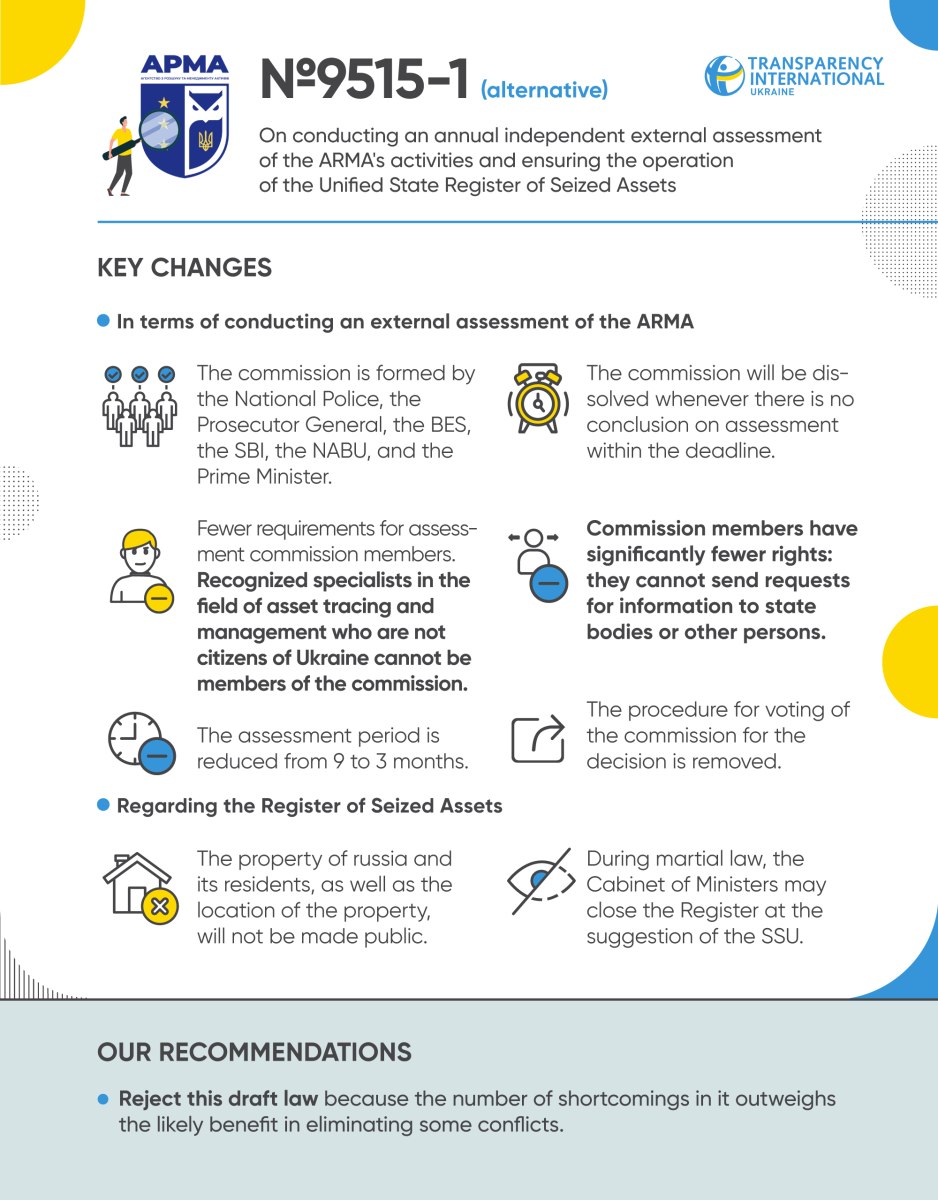

At a meeting of the Anti-Corruption Committee of the Parliament on July 13, 2023, MPs announced that they would determine a new basis for the termination of the powers of the ARMA Head. On July 20, the draft of the relevant changes was registered in the Rada.
The authors of the new draft law are members of the anti-corruption committee Anastasiia Radina, Oleksii Zhmerenetskyi, Yaroslav Yurchyshyn, and Viktoriia Siumar. The document concerns an annual independent external assessment of the Agency’s activities and ensuring the functioning of the Unified State Register of Assets Seized in Criminal Proceedings. Let’s cover the details.
Other members of the anti-corruption committee, Oleksandr Tkachenko, Antonina Slavytska, Ivan Shynkarenko, and Valerii Sterniichuk, developed an alternative draft law, which was registered on July 26. It addresses the same issues, but the approach to them is significantly different.
TI Ukraine’s legal advisor Pavlo Demchuk analyzed both documents and identified the advantages and disadvantages in them.
Current regulation
The provisions of the draft law relate to two elements: the external independent assessment of the ARMA and the openness of the register of seized assets.
As of today, one of the forms of control over the Agency’s activities is their independent external assessment. It should be conducted annually by a commission of three persons determined by the President of Ukraine, the Verkhovna Rada, and the Cabinet of Ministers. Such an assessment has never been carried out since the establishment of the ARMA.
The register of seized assets was unavailable to the public from the beginning of the full-scale war until August 25, 2023, although in accordance with Article 25 of the Law of Ukraine on the ARMA, the data of such a register had to be public. As of now, the register is open, but it does not contain:
- information about seized assets, which makes it possible to identify the location of assets (property), and the person who owns, uses, or disposes of them;
- the identity of the suspect or accused;
- data that are not subject to disclosure in the framework of international cooperation in accordance with international treaties of Ukraine.
The completeness of the register leaves much to be desired because, for instance, as far as assets of PJSC Vinnytsiapobutkhim are concerned, we can see neither the amount of the security deposit that the manger is to pay to the national budget nor other essential conditions of the concluded management contract, which would allow assessing the quality of the work of the ARMA and the manager.
The register of seized assets was unavailable to the public from the beginning of the full-scale war until August 25, 2023, although in accordance with Article 25 of the Law of Ukraine on the ARMA, the data of such a register had to be public.
How does draft law No.9515 propose to correct these shortcomings?
The authors of the main draft law note that the appointment of members of the commission to conduct the independent external assessment of the ARMA by the President is a power that is not inherent of him under the Constitution.
A similar issue was previously analyzed in the decision of the Constitutional Court of Ukraine dated September 16, 2020. It related to the constitutionality of certain provisions of the Law of Ukraine on the National Anti-Corruption Bureau of Ukraine, which contained similar provisions.
Given that the Law on the NABU was amended to implement the above-mentioned decision of the CCU, it seems that identical changes should be made to the Law on the ARMA.
The authors of the draft law propose to include 6 people in the commission. Three of them will be appointed by the head of the State Financial Monitoring Service, the Prosecutor General, and the Director of the National Anti-Corruption Bureau of Ukraine, and another 3 persons will be appointed by the Cabinet of Ministers in accordance with the joint proposal of international and foreign organizations. We are talking about those organizations that, in accordance with international or interstate agreements, during the past 3 years before the assessment, provided Ukraine with international technical assistance in the field of preventing and countering corruption, criminal justice or asset finding, tracing and management.
The draft defines that the members of the Assessment Commission should be persons who have at least 5 years of experience in pre-trial investigation bodies, prosecutor’s office, or courts, other state bodies (including foreign ones) or in international, foreign organizations. In these bodies (organizations), these persons were to carry out activities related to:
- tracing and finding assets derived from corruption or other criminal offenses;
- recovery of the assets;
- international cooperation in finding, tracing, and recovering the assets;
- management of confiscated or seized assets;
- expert or advisory support of state bodies on the above issues.
The draft law proposes to regulate the terms within which each of the subjects of appointment can nominate candidates for the commission, and then this list of persons must be approved by the Cabinet. It also determines the term of the commission’s work — no more than nine months from the last day of the year for which the assessment is carried out.
The draft law also regulates in detail the procedure for the exercise of powers by commission members, voting, as well as financing their work and the secretariat.
In terms of openness of the register, MPs propose to oblige the ARMA to provide open round-the-clock access through its official website to all data of the Register. The only exceptions will be data that make it possible to identify the person who owns, uses, disposes of such assets (property); the identity of the suspect or accused, as well as data that, within the framework of international cooperation, are not subject to disclosure in accordance with international treaties of Ukraine.
That is, it is proposed to remove the obligation not to identify the person from the text of the law on the ARMA. This remains relevant even after the opening of the register, considering the comments provided further.
The draft law also specifies that access to the register will be provided in various ways, including in the format of a dataset (electronic document), which will allow for its automated processing by electronic means.
In addition, deadlines are set for the ARMA to open the register and submit a report on its operation — by December 1, 2023, and for the Cabinet to process the report on the operation of the Register for compliance with the requirements of this Law — by December 31, 2023. If the register does not function as defined in the law, the Cabinet of Ministers must dismiss the ARMA Head by December 31, 2023.
In our opinion, the audit of the register remains relevant given the quality of its contents.
In addition, deadlines are set for the ARMA to open the register and submit a report on its operation — by December 1, 2023, and for the Cabinet to process the report on the operation of the Register for compliance with the requirements of this Law — by December 31, 2023. If the register does not function as defined in the law, the Cabinet of Ministers must dismiss the ARMA Head by December 31, 2023.
Comments to the main draft law
First of all, the extraordinary relevance of an additional legislative regulation of the issues raised in the main draft law should be noted. After all, the absence of an external independent audit of the ARMA’s activities does not allow operating with an objective assessment of the institution’s work.
However, there are some caveats. As far as the main draft law is concerned, the following is worth mentioning.
- Number of persons who should be part of the assessment commission. According to the draft law, there should be six of them. For example, according to the law on the NABU and on Prevention of Corruption, there are only three members in such commissions. This is quite acceptable from the perspective of the distribution of tasks on various aspects of the body’s activities and reaching a consensus on the content of the report.
- Reduce the list of requirements for persons who may apply for the position of a member of the assessment commission. Reducing the number of requirements for members of the assessment commission by expanding the range of their professional background will allow coping with the search for potential candidates for such positions because there are not as many specialists in the field of asset finding and tracing as we would like.The working profile of the commission member should be more specialized than that of the ARMA Head.
- Provisions prohibiting the identification of a person should be removed as contrary to the purpose of the Register. Information about the asset and its location may help identify the person who owns it. The register is designed to raise the awareness of potential managers regarding the property to be managed and allow the public to monitor the activities of the Agency.
- Make the report on the work of the Register public to ensure civil oversight. The Agency is obliged to inform the Verkhovna Rada of Ukraine and provide the Cabinet of Ministers with a report on the operation of the Register. At the same time, the publication of such a report is not currently provided for by law.
It should also be considered that the information in the Register is entered by authorized employees of the Agency. However, the data to be entered into the Register shall be submitted to the ARMA by means of electronic communication by investigators, detectives, prosecutors, judges, state executors, other officials and officers no later than the next working day after the occurrence of the grounds for submitting such information. That is, the completeness of the Register depends not only on the ARMA, but also on other bodies. The government should consider it when assessing the Agency’s report.
The completeness of the Register depends not only on the ARMA, but also on other bodies. The government should consider it when assessing the Agency's report.
What is proposed in the alternative draft law?
In general, the document proposes to eliminate certain conflicts, regulate in less detail the procedure for the work of the ARMA Assessment Commission, and supplement the specialized law with dubious provisions.
The authors of the alternative draft law want the composition of the commission to be formed by the National Police, the Prosecutor General, the Bureau of Economic Security, the State Bureau of Investigation, the National Anti-Corruption Bureau, and the Prime Minister. They also simplify the requirements for members of the selection commission. We are talking about a citizen of Ukraine who has at least 5 years of experience in pre-trial investigation, prosecution, bar, scientific institutions, courts in foreign countries and in international organizations, has the necessary knowledge and skills to conduct such an assessment, and also has an impeccable business reputation.
That is, under this draft law, internationally recognized specialists in the field of asset tracing and management, who are not citizens of Ukraine, cannot be engaged in the work of the commission.
Moreover, the authors of the alternative draft law remove a specific term for nominating commission members by each of the bodies, reduce the assessment period (from 9 to 3 months), remove the procedure for voting for the decision of the commission, and also deprive the subjects of appointment of commission members of the opportunity to determine alternate members.
The draft law significantly reduces the scope of rights of commission members. The possibility to request state bodies, any natural persons, or legal entities to provide explanations, documents, or information necessary for the assessment, as well as the chance to use the help of assistants, shall be removed.
The authors of the draft law propose to dissolve the commission whenever there is no conclusion of an independent external assessment of the ARMA’s activities within three months.
In terms of the register of seized assets, the draft law proposes not to reflect the property of russia and its residents, as well as information on the location of property. It also suggests adding that for the period of martial law, access to this register can be closed on the basis of a decision of the Cabinet of Ministers on the proposal of the Security Service of Ukraine.
In addition, the draft law proposes to determine that the deputy heads of the Agency are dismissed simultaneously with the appointment of a new ARMA Head. It also aims to specify that the reason for the termination of the powers of the ARMA Head is the conclusion of an independent external assessment. To date, there is no indication in the specialized law that it should be an independent external assessment, although it has the same name in Article 12.
The alternative draft law has more significant drawbacks.
This document does not regulate important issues related to the work of the external assessment commission:
- terms of nomination of candidates for members of the commission;
- the procedure for voting for the report on assessment;
- the possibility for commission members to appeal to legal entities and natural persons;
- the possibility to have assistants;
- organization of the work of the Secretariat of the commission as a whole;
- banning former ARMA employees from participating in the work of the commission.
It is most likely that all these points were carefully considered in the main draft law due to previous experience. Therefore, it is crucial to define the basic rules for the work of commissions to assess anti-corruption infrastructure bodies in the law.
In addition, some provisions of the proposed project are openly pro-Russian. For example, for what purpose do the authors propose to conceal the property of russia and its residents in the register?
The provisions on closing the information of the register of seized assets contradict the requirements of civil society.
In addition, some provisions of the proposed project are openly pro-Russian. For example, for what purpose do the authors propose to conceal the property of russia and its residents in the register?
Conclusions
Transparency International Ukraine supports the adoption of draft law No.9515 as a basis, with a possibility of finalization. It is really designed to solve urgent tasks — to form an effective means of external assessment of the work of the ARMA and to open access to the register of seized assets. The alternative draft law should be rejected because the number of shortcomings in it outweighs the likely benefit in eliminating some conflicts.
However, the main draft law needs finalization to make these tools work properly. In particular, it is worth paying attention to the following significant shortcomings:
- the number of members of the assessment commission should be reduced to three, who are appointed by the Cabinet of Ministers on the basis of proposals from international partners;
- expand the circle of persons who can apply for the position of a member of the assessment commission;
- remove the ban on disclosing data of the register that make it possible to identify the person who owns, uses, or disposes of such assets (property);
- expand the amount of information published in the Register to be able to evaluate the terms of the management contract and their implementation.
- oblige to publish a report on the operation of the Register, which should be developed by the Agency by December 1, 2023;
- determine that when assessing the completeness of entering information into the Register, it is necessary to consider the features of filling it out.
However, the ARMA’s issues do not end with an audit and a register of seized assets. We would like to draw the attention of MPs to the traditional problems that accompany the operation of the ARMA.
- Lack of planning before the transfer of property to the ARMA. Because of this, assets that cannot be effectively managed are transferred to the body and, everyone wonders why the ARMA does not generate income.
- The obligation of the manager of corporate rights to coordinate their actions in the management body of the legal entity with the owner of such rights. Thus, all multimillion assets in the form of corporate rights transferred to the Agency lose their value.
- Non-transparency of competitions to determine the manager of seized assets. Because of this, it is impossible to ensure competition and interest of the business in the implementation of the contract to manage seized assets.
- Non-transparency in the sale of seized property.
- Low quality of measures to control the effectiveness of the management of seized assets. The main focus is on desk audits, that is, those conducted on the basis of documents submitted by the manager. This makes it easier to mislead the Agency’s employees or for them to abuse their powers.
Transparency International Ukraine supports the adoption of draft law No.9515 as a basis, with a possibility of finalization. However, the main draft law needs finalization to make these tools work properly.








